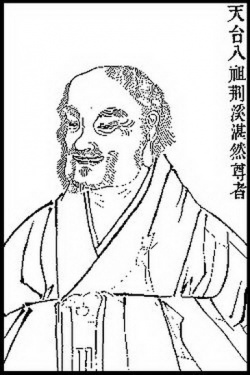Difference between revisions of "Zhanran"
| Line 1: | Line 1: | ||
[[File:Zhanran.JPG|thumb|250px|]] | [[File:Zhanran.JPG|thumb|250px|]] | ||
| − | [[Zhanran]] ({{Wiki|Chinese}}: [[湛然]]; pinyin: [[Zhànrán]]; Wade–Giles: [[Chan-ja]]n; 711-782) was the sixth [[Patriarch]] of the [[Tiantai School]] of [[Chinese Buddhism]]. His lay surname was | + | [[Zhanran]] ({{Wiki|Chinese}}: [[湛然]]; pinyin: [[Zhànrán]]; Wade–Giles: [[Chan-ja]]n; 711-782) was the sixth [[Patriarch]] of the [[Tiantai School]] of [[Chinese Buddhism]]. His lay surname was Qi 戚 and he was also known as [[Jingqi]] 荊溪 after his birthplace (in {{Wiki|modern}} day [[Yixing]] [[宜興]] county, Jiangsu province). [[Zhanran]] is best known for his scriptural {{Wiki|exegesis}} of such works as [[Zhiyi's]] [[Mohe zhiguan]] (The [[Great Calming and Contemplation]]), as well as his promotion of the [[Doctrine]] of [[universal]] [[Buddha-nature]]. He is the author of The [[Adamantine Scalpel]] ([[金剛錍]] [[Jin'gang Pi]]) among other works. |
[[Zhanran]] (Jingqi [[Zhanran]] and [[Miaole dashi]], 711–782) is the [[ninth patriarch]] of the [[Tiantai]] school of [[Chinese Buddhism]] and the [[sixth patriarch]] following [[Zhiyi]] (538–597), the de facto {{Wiki|architect}} of the [[tradition]]. Author of the first authoritative commentaries on the major works of [[Zhiyi]], [[Zhanran]] revitalized and reformed [[Tiantai]] during the {{Wiki|Tang dynasty}} (618–907). | [[Zhanran]] (Jingqi [[Zhanran]] and [[Miaole dashi]], 711–782) is the [[ninth patriarch]] of the [[Tiantai]] school of [[Chinese Buddhism]] and the [[sixth patriarch]] following [[Zhiyi]] (538–597), the de facto {{Wiki|architect}} of the [[tradition]]. Author of the first authoritative commentaries on the major works of [[Zhiyi]], [[Zhanran]] revitalized and reformed [[Tiantai]] during the {{Wiki|Tang dynasty}} (618–907). | ||
Latest revision as of 08:15, 20 September 2013
Zhanran (Chinese: 湛然; pinyin: Zhànrán; Wade–Giles: Chan-jan; 711-782) was the sixth Patriarch of the Tiantai School of Chinese Buddhism. His lay surname was Qi 戚 and he was also known as Jingqi 荊溪 after his birthplace (in modern day Yixing 宜興 county, Jiangsu province). Zhanran is best known for his scriptural exegesis of such works as Zhiyi's Mohe zhiguan (The Great Calming and Contemplation), as well as his promotion of the Doctrine of universal Buddha-nature. He is the author of The Adamantine Scalpel (金剛錍 Jin'gang Pi) among other works.
Zhanran (Jingqi Zhanran and Miaole dashi, 711–782) is the ninth patriarch of the Tiantai school of Chinese Buddhism and the sixth patriarch following Zhiyi (538–597), the de facto architect of the tradition. Author of the first authoritative commentaries on the major works of Zhiyi, Zhanran revitalized and reformed Tiantai during the Tang dynasty (618–907).
Zhanran trained for twenty years on Mount Zuoji in Zhejiang under Xuanlang (673–754), who became the eighth patriarch, and he remained active in the southeast both in his native Jiangsu and in the environs of Mount Tiantai in Zhejiang. Avoiding the northern political centers, Zhanran declined several
